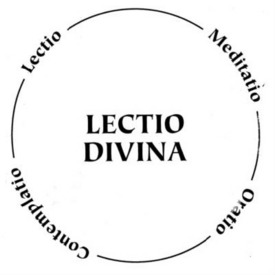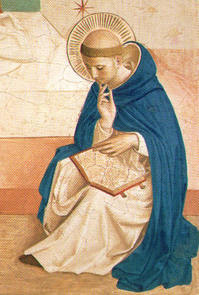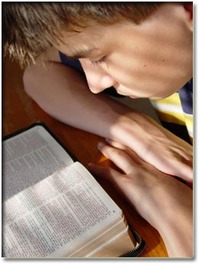 Pope Benedict reviews "... the basic steps of this
procedure. It opens with the reading (lectio)
of a text, which leads to a desire to understand its true content: what does
the biblical text say in itself? Without this, there is
always a risk that the text will become a pretext for never moving beyond our
own ideas. Next comes meditation (meditatio),
which asks: what does the biblical text say to us?
Here, each person, individually but also as a member of the community, must let
himself or herself be moved and challenged. Following this comes prayer (oratio),
which asks the question: what do we say to the Lord in response to his word?
Prayer, as petition, intercession, thanksgiving and praise, is the primary way
by which the word transforms us. Finally, lectio divina
concludes with contemplation (contemplatio), during which
we take up, as a gift from God, his own way of seeing and judging reality, and
ask ourselves what conversion of mind, heart and life is the Lord asking of
us? In the Letter to the Romans,
Saint Paul tells us: "Do not be conformed to this world, but be transformed by
the renewal of your mind, that you may prove what is the will of God, what is
good and acceptable and perfect" (12:2). Contemplation aims at creating within
us a truly wise and discerning vision of reality, as God sees it, and at
forming within us "the mind of Christ" (1 Cor
2:16). The word of God appears here as a criterion for discernment: it is
"living and active, sharper than any two-edged sword, piercing to the division
of soul and spirit, of joints and marrow, and discerning the thoughts and
intentions of the heart" (Heb 4:12). We do well also
to remember that the process of lectio divina
is not concluded until it arrives at action (actio),
which moves the believer to make his or her life a gift for others in charity" (Verbum Domini, 87).
Pope Benedict reviews "... the basic steps of this
procedure. It opens with the reading (lectio)
of a text, which leads to a desire to understand its true content: what does
the biblical text say in itself? Without this, there is
always a risk that the text will become a pretext for never moving beyond our
own ideas. Next comes meditation (meditatio),
which asks: what does the biblical text say to us?
Here, each person, individually but also as a member of the community, must let
himself or herself be moved and challenged. Following this comes prayer (oratio),
which asks the question: what do we say to the Lord in response to his word?
Prayer, as petition, intercession, thanksgiving and praise, is the primary way
by which the word transforms us. Finally, lectio divina
concludes with contemplation (contemplatio), during which
we take up, as a gift from God, his own way of seeing and judging reality, and
ask ourselves what conversion of mind, heart and life is the Lord asking of
us? In the Letter to the Romans,
Saint Paul tells us: "Do not be conformed to this world, but be transformed by
the renewal of your mind, that you may prove what is the will of God, what is
good and acceptable and perfect" (12:2). Contemplation aims at creating within
us a truly wise and discerning vision of reality, as God sees it, and at
forming within us "the mind of Christ" (1 Cor
2:16). The word of God appears here as a criterion for discernment: it is
"living and active, sharper than any two-edged sword, piercing to the division
of soul and spirit, of joints and marrow, and discerning the thoughts and
intentions of the heart" (Heb 4:12). We do well also
to remember that the process of lectio divina
is not concluded until it arrives at action (actio),
which moves the believer to make his or her life a gift for others in charity" (Verbum Domini, 87).
Lectio Divina: November 2010 Archives
 Pope Benedict reviews "... the basic steps of this
procedure. It opens with the reading (lectio)
of a text, which leads to a desire to understand its true content: what does
the biblical text say in itself? Without this, there is
always a risk that the text will become a pretext for never moving beyond our
own ideas. Next comes meditation (meditatio),
which asks: what does the biblical text say to us?
Here, each person, individually but also as a member of the community, must let
himself or herself be moved and challenged. Following this comes prayer (oratio),
which asks the question: what do we say to the Lord in response to his word?
Prayer, as petition, intercession, thanksgiving and praise, is the primary way
by which the word transforms us. Finally, lectio divina
concludes with contemplation (contemplatio), during which
we take up, as a gift from God, his own way of seeing and judging reality, and
ask ourselves what conversion of mind, heart and life is the Lord asking of
us? In the Letter to the Romans,
Saint Paul tells us: "Do not be conformed to this world, but be transformed by
the renewal of your mind, that you may prove what is the will of God, what is
good and acceptable and perfect" (12:2). Contemplation aims at creating within
us a truly wise and discerning vision of reality, as God sees it, and at
forming within us "the mind of Christ" (1 Cor
2:16). The word of God appears here as a criterion for discernment: it is
"living and active, sharper than any two-edged sword, piercing to the division
of soul and spirit, of joints and marrow, and discerning the thoughts and
intentions of the heart" (Heb 4:12). We do well also
to remember that the process of lectio divina
is not concluded until it arrives at action (actio),
which moves the believer to make his or her life a gift for others in charity" (Verbum Domini, 87).
Pope Benedict reviews "... the basic steps of this
procedure. It opens with the reading (lectio)
of a text, which leads to a desire to understand its true content: what does
the biblical text say in itself? Without this, there is
always a risk that the text will become a pretext for never moving beyond our
own ideas. Next comes meditation (meditatio),
which asks: what does the biblical text say to us?
Here, each person, individually but also as a member of the community, must let
himself or herself be moved and challenged. Following this comes prayer (oratio),
which asks the question: what do we say to the Lord in response to his word?
Prayer, as petition, intercession, thanksgiving and praise, is the primary way
by which the word transforms us. Finally, lectio divina
concludes with contemplation (contemplatio), during which
we take up, as a gift from God, his own way of seeing and judging reality, and
ask ourselves what conversion of mind, heart and life is the Lord asking of
us? In the Letter to the Romans,
Saint Paul tells us: "Do not be conformed to this world, but be transformed by
the renewal of your mind, that you may prove what is the will of God, what is
good and acceptable and perfect" (12:2). Contemplation aims at creating within
us a truly wise and discerning vision of reality, as God sees it, and at
forming within us "the mind of Christ" (1 Cor
2:16). The word of God appears here as a criterion for discernment: it is
"living and active, sharper than any two-edged sword, piercing to the division
of soul and spirit, of joints and marrow, and discerning the thoughts and
intentions of the heart" (Heb 4:12). We do well also
to remember that the process of lectio divina
is not concluded until it arrives at action (actio),
which moves the believer to make his or her life a gift for others in charity" (Verbum Domini, 87).
In the Apostolic Exhortation Verbum Domini released today, I immediately started reading the document for what the Pope had to say about lectio divina. You may recall the Pope's remarks for the 40th anniversary of Dei Verbum in 2005, he said lectio divina will bring about a spiritual springtime in Church. His words were:
"the diligent reading of Sacred Scripture accompanied by prayer brings about that intimate dialogue in which the person reading hears God who is speaking, and in praying, responds to him with trusting openness of heart (cf. Dei Verbum, 25). If it is effectively promoted, this practice will bring to the Church --I am convinced of it-- a new spiritual springtime."
No less than 16 times does His Holiness use the words lectio divina.
Here are some points of interest in Verbum Domini regarding lectio:
 46. Listening together to the word of God, engaging in
biblical lectio divina, letting ourselves be struck by the
inexhaustible freshness of God's word which never grows old, overcoming our
deafness to those words that do not fit our own opinions or prejudices,
listening and studying within the communion of the believers of every age: all
these things represent a way of coming to unity in faith as a response to
hearing the word of God.
46. Listening together to the word of God, engaging in
biblical lectio divina, letting ourselves be struck by the
inexhaustible freshness of God's word which never grows old, overcoming our
deafness to those words that do not fit our own opinions or prejudices,
listening and studying within the communion of the believers of every age: all
these things represent a way of coming to unity in faith as a response to
hearing the word of God.

